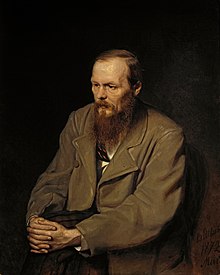Fedor Dostoevsky
| Fyodor Dostoyevsky | |
|---|---|

Portrait of Dostoyevsky by Vasily Perov, 1872
|
|
| Born | Fyodor Mikhailovich Dostoyevsky 11 November 1821 Moscow, Russian Empire |
| Died | 9 February 1881 (aged 59) Saint Petersburg, Russian Empire |
| Nationality | Russian |
| Education | Military Engineering-Technical University, St. Petersburg |
| Period | 1846–1880 |
| Genre | Novel, short story, journalism |
| Subject | Psychology, philosophy, Christianity |
| Literary movement | Realism |
| Notable works |
Notes from Underground Crime and Punishment The Idiot Demons The Brothers Karamazov |
| Spouse |
|
| Children | Sonya (1868) Lyubov (1869–1926) Fyodor (1871–1922) Alexey (1875–1878) |
|
|
|
| Signature | |
Fyodor Mikhailovich Dostoyevsky (/ˌdɒstəˈjɛfski, ˌdʌs-/;Russian: Фёдор Миха́йлович Достое́вский; IPA: [ˈfʲɵdər mʲɪˈxajləvʲɪtɕ dəstɐˈjɛfskʲɪj]; 11 November 1821 – 9 February 1881), sometimes transliterated Dostoevsky, was a Russian novelist, short story writer, essayist, journalist and philosopher. Dostoyevsky's literary works explore human psychology in the troubled political, social, and spiritual atmosphere of 19th-century Russia, and engage with a variety of philosophical and religious themes.
He began writing in his 20s, and his first novel, Poor Folk, was published in 1846 when he was 25. His most acclaimed works include Crime and Punishment (1866), The Idiot (1869), Demons (1872) and The Brothers Karamazov (1880). Dostoyevsky's oeuvre consists of 11 novels, three novellas, 17 short stories and numerous other works. Many literary critics rate him as one of the greatest psychologists in world literature. His 1864 novella Notes from Underground is considered to be one of the first works of existentialist literature.
...
Wikipedia
